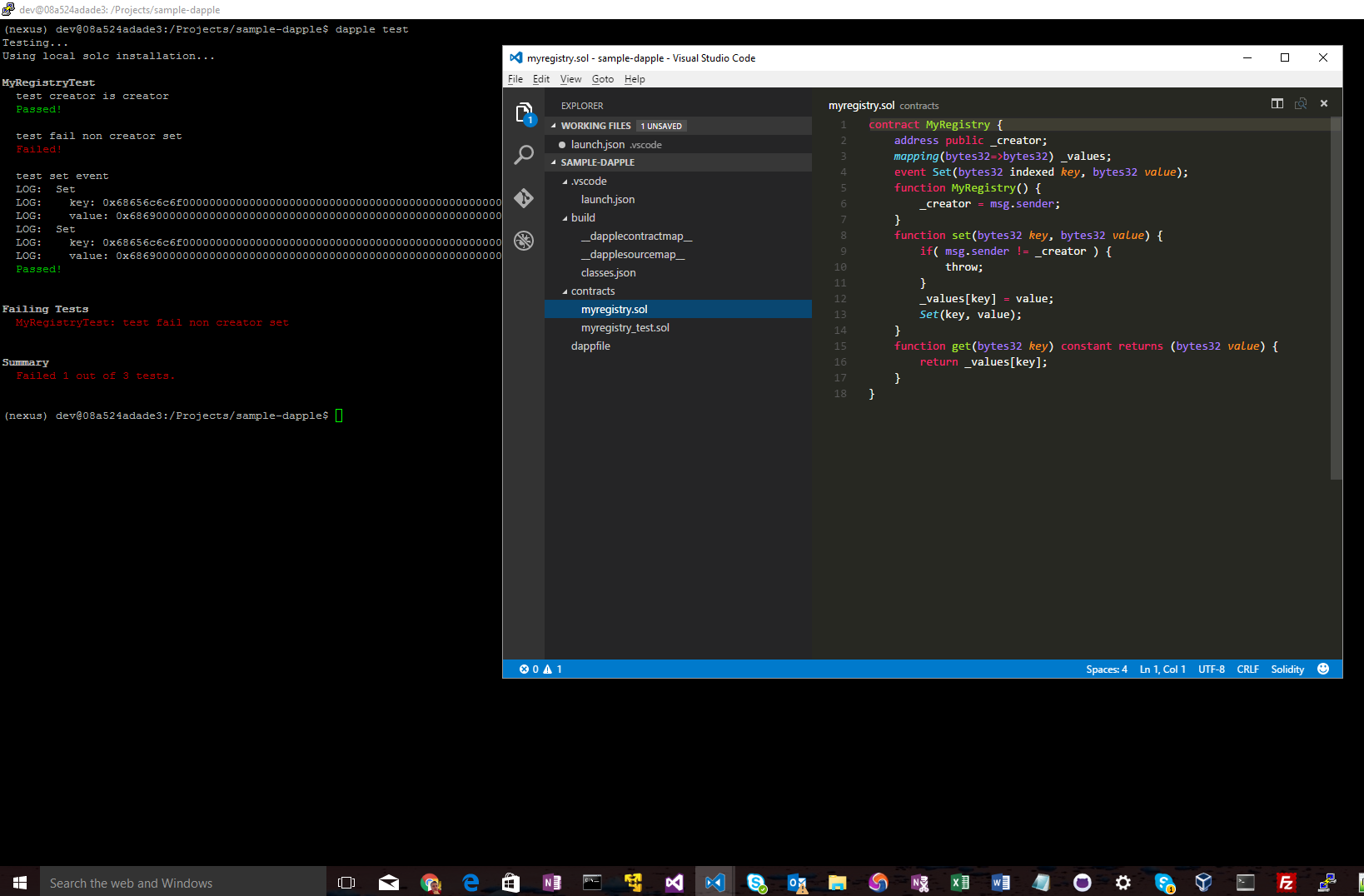Developing Smart Contracts in Ethereum with Dapple and Visual Studio Code in Windows with Docker.
Dapple from its origins as Python tool to its current implementation in node.js has fascinated me. With dapple you can unit test your Ethereum Solidty contracts using Solidity, the same way as if you test C# code with C# Code, Javascript, etc.
But dapple is not just limited to testing, it allows you to, install, package and deploy and bundle scripts.
For more information about dapple check the dapple Github repository
Installing Dapple in Windows, has been always an issue, similar to Ethereum, there are lots of hurdles to get through due to the different dependencies.
Microsoft has announced recently the Windows 10 Ubuntu Bash Shell which will eventually solve this issues, but at the moment the current preview release is in early stages.
Docker and Nexus to the rescue
The Nexus team responsible for Dapple (well Ryan) has a docker image which includes all the Ethereum related tools already installed.
It includes :
- NodeJS
- Python + pip
- solc
- IPFS
- geth
- Git
- Vim
- inotifytools
- All of Nexus' Github repositories
- An FTP server
- A unprivileged default user
You can find it here: https://hub.docker.com/r/ryepdx/nexus_dev/
But to simplify things, I have created another version which includes Dapple already installed from source. (npm install -g or link can take a long time).
You can find it here: https://hub.docker.com/r/juanfranblanco/dapple/
Adding Visual Studio Code to the mix
Coding using Vim inside Docker can be a dunting experience if you are not used to Vim, and what I wanted to achieve was something like this:

In here you can code in Visual Studio Code using the Solidty Extension in windows, and run the tests, deployment, etc on your Docker container.
The Steps
Install Docker (Docker tool box) from https://docs.docker.com/engine/installation/windows/, and follow the instructions to configuere docker-machine and enviroment variables.
Once ready you should be able to run your container like:
docker run -d -v /c/Users/{Your project folder}:/Projects -p 4001:4001 -p 5001:5001 -p 8000:8000 -p 8080:8080 -p 2121:21 -p 2222:22 -p 30000-30009:30000-30009 -p 30303:30303 -p 9000:8545 --name ethdev juanfranblanco/dapple
A bit of explanation:
*run* will create and start your container
*-d* will start your container dettached (it will run in the background)
*-v* will mount a volume in your container, docker toolbox / boot2docker mounts automatically the c:/users folder in the host vm so we can use /c/Users/... and map it and moount to a folder called :/Projects (Change this to whatever you like)
*-p* is the mapping of ports exposed fore example ftp 21 is 2121, ssh 22 is 2222
*--name* is our friendly container name
and finally juanfranblanco/dapple is the image to download from docker hub.
Install Putty if not already and ssh to your machine using port 2222.
To find out the ip address of your vm run
docker-machine lsand use the ip address of default to connect to the machine.
The user is dev and the password is nexus
Now you should be able to run
dappleor navigate to your projects folder likecd \ProjectsInstall Visual Studio code (In Windows)
Download from https://code.visualstudio.com/
Once installed type:
F1to bring the menuext installto install an extensionsolidityto install the solidity extension
Create your first project and test
On your putty window (ssh) navigate to your projet folder and create a directory
cd \Projectmkir sample-dapplecd sample-dappleInitialise dapple and enter your configuration if asked
dapple initNow go to your visual studio code and open the folder sample-dapple
On the contracts folder create a new contract file called "myregistry.sol"
contract MyRegistry {
address public _creator;
mapping(bytes32=>bytes32) _values;
event Set(bytes32 indexed key, bytes32 value);
function MyRegistry() {
_creator = msg.sender;
}
function set(bytes32 key, bytes32 value) {
if( msg.sender != _creator ) {
throw;
}
_values[key] = value;
Set(key, value);
}
function get(bytes32 key) constant returns (bytes32 value) {
return _values[key];
}
}
- And another for your tests
import 'dapple/test.sol';
import 'myregistry.sol';
// Deriving from `Test` marks the contract as a test and gives you access to various test helpers.
contract MyRegistryTest is Test {
MyRegistry reg;
Tester proxy_tester;
// The function called "setUp" with no arguments is
// called on a fresh instance of this contract before
// each test. TODO: Document when to put setup logic in
// setUp vs subclass constructor when writing Test subclasses
function setUp() {
reg = new MyRegistry();
proxy_tester = new Tester();
proxy_tester._target(reg);
}
function testCreatorIsCreator() {
assertEq( address(this), reg._creator() );
}
function testFailNonCreatorSet() {
MyRegistry(proxy_tester).set("no", "stop");
}
event Set(bytes32 indexed key, bytes32 value);
function testSetEvent() {
expectEventsExact(reg);
Set("hello", "hi");
reg.set("hello", "hi");
}
}
Go to your shh window and run
dapple testand see the magic :)
Further improvements for the Container and Image.
Ideally it should be not be required to ssh to the container, on Visual Studio Code you can run commands which can be executed in the container by using docker exec. This could be done in the future when ethereum, dapple, solc, ipfs is more stable.